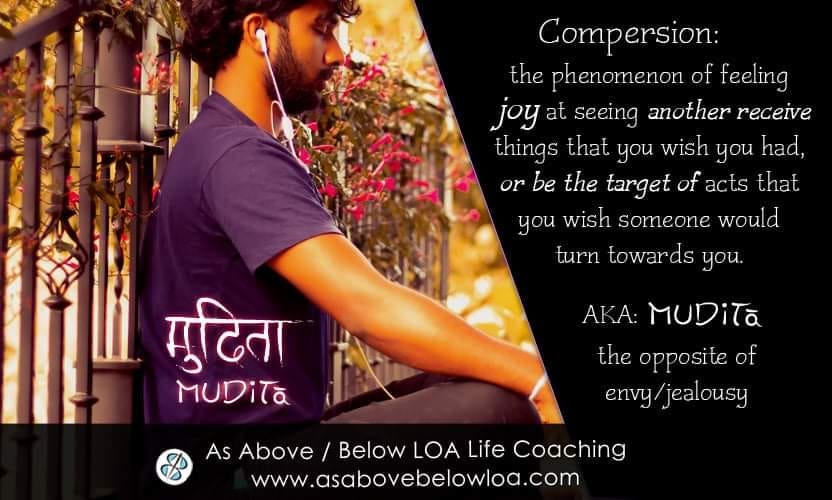Feeling Joy For Others Helps You
Envy & Jealousy Help You To Know What You Desire & How To Get It
I saw a Note yesterday and it reminded me of a Facebook post I’d made in 2020. Here’s the note I saw:
Andrew was describing the feeling of compersion, aka Mudita, which is the opposite of envy/jealousy. Compersion has been defined as “the phenomenon of feeling joy at seeing another receive things you wish you had, or be the target of acts that you wish someone would turn towards you.”
Freudenfreude vs Schadenfreude
I found out through our conversation that the New York Times tried to promote the word “Freudenfreude” which angered some Germans who complained it wasn’t a German word. That word basically translates to “Joy Joy” so I can see why they’d complain. They were trying to come up with the opposite of “schadenfreude.” Schadenfreude has been defined as joy derived from the misfortunes of others.
I’ve had moments of joy while others were suffering, but not because they were suffering. It was because they were experiencing the effects of what they had caused. The joy came from watching them learn not to do things that wouldn’t work out for them. Some might call that schadenfreude, but I honestly wouldn’t. I’m reminded to explain that everyone has different definitions of words. It’s important to remember that.
What I would refer to as schadenfreude would be people behaving sadistically or others watching something sadistic and enjoying that. To me, schadenfreude would require someone causing pain on purpose and then someone being “euphoric” about another in pain. I don’t think people get true happiness that way, but they get some sort of “sadistic euphoria” feeling out of it. The word “euphoria” is defined as reduced anxiety and likened to a drug on Merriam-Webster. It’s not happiness.
Compersion
Compersion is usually used in Polyamory because participants want to cultivate the feeling of being happy for their partner when he or she is having romantic relations with another person.
Mudita aka Sanskrit मुदिता
Mudita “is a dharmic concept of joy, particularly an especially sympathetic or vicarious joy—the pleasure that comes from delighting in other people's well-being.” (Wikipedia) This concept has been around for a long time. They even have Mudita meditations.
Why Do You Feel Envious or Jealous?
The reason that I originally wrote about this concept was because most people don’t think about their feelings and why they’re feeling them.
When you feel envious that someone has an object or has an experience that you would like for yourself, that feeling of envy is a sign that you have a limiting belief that says you cannot have that for yourself.
Your emotions tell you a lot about your beliefs. If you’re feeling positive emotions then it means you’ve got good beliefs around whatever you’re thinking of at that moment. If you have negative emotions then it means you have limiting beliefs.
Seeing Someone Else in Joy
When you see someone else experiencing a great moment, and you start to feel jealous or angry, consider what it is they have that you want for yourself. Then ask yourself:
“Why do I want that?”
“Why do I think I can’t have that?”
“What emotion would I feel if I had that thing or experience?”
“How can I find that feeling or emotion right now in some other manner?”
And then meditate and try to find the feeling that you are truly desiring. That feeling will likely match up exactly with what you think the other person is feeling. If you are a praying person, you can also pray to feel that feeling or for help to find that feeling, just as you can pray to be happy for others. God wants you to love others as yourself and to be happy in your life. If it’s God’s will and you’re asking for it, it will be done.
Meditating on this feeling that you desire, trying to feel it in the moment without any physical manifestations, is how to attract physical manifestations of it into your life.
Seeing Others As Vibrational Anchors
I once recorded a video about creating vibrational anchors. In it, I discussed associating positive emotions with physical or auditory “anchors.” For example, if you want to exercise or clean the house but don’t enjoy doing it, listen to music that uplifts and energizes you. The music can help lift your “vibration” to match a higher vibration even while you’re doing something you wouldn’t like to be doing.
So, you can look at this person or people who are experiencing joy and attempt to feel compersion or Mudita for them. You can see them as examples of what you desire. The feelings that you think they’re feeling are what you want. They’re your goal. That’s important for you to know about yourself.
Signs of Land
You can view them as “signs of land.” If you were on a ship in the sea and couldn’t see any land and had no idea where you were or if you were even heading in the correct direction, and you saw birds, you’d be happy. Seeing birds means you’re close to land because they eventually tire and need a home, on land, to go back to. It means you’re getting close to where you want to be.
When you see people who are experiencing things you want to experience, you can see them as signs that you’re getting closer to those things you want. As you start to feel better for them and feel more Mudita/compersion, it means that you are getting closer to attracting that same feeling and experience into your own life.
You can tell how close you are by how you feel. The more negative feeling, the more you’re blocking it from entering your own life. The more positive feeling, the more you are letting it into your own life. So practice feeling good for others when they experience things you’d like to experience.
You can start to be thankful for these signs because they’re opportunities for you to meditate on and start attracting more awesome things and experiences into your own life.





Hey Barbara, I appreciate your clear articulation of this vital aspect of the manifesting process.